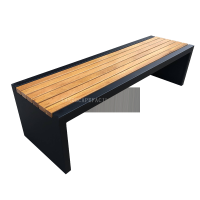Welcome to the website for landscape facilities products and knowledge.
What are the best materials for a landscape bar counter in mountainous regions with variable weather?
When designing an outdoor bar counter for mountainous regions, material selection becomes critical due to extreme weather fluctuations, temperature variations, and environmental exposure. The ideal materials must withstand harsh sunlight, freezing temperatures, heavy rain, and potential snow while maintaining structural integrity and aesthetic appeal.
Natural stone options like granite and quartzite stand out as premier choices for mountain landscape bars. Their dense mineral composition makes them exceptionally resistant to weathering, UV radiation, and temperature extremes. Granite particularly excels with its non-porous surface when properly sealed, preventing water absorption that could lead to cracking during freeze-thaw cycles. These stones also provide substantial thermal mass, helping to stabilize surface temperatures despite fluctuating conditions.
Stainless steel emerges as another superior option, especially for contemporary mountain designs. Its non-porous surface resists moisture penetration, prevents microbial growth, and handles temperature extremes without cracking or warping. While requiring occasional maintenance to prevent surface scratches, stainless steel offers exceptional durability against impact and weather elements. The material's natural reflectivity can also help manage solar heat gain in high-altitude settings.
For those seeking warmer aesthetics, dense tropical hardwoods like teak, ipe, or shorea present excellent options. These woods naturally contain high oil content and dense grain patterns that resist moisture penetration, rot, and insect damage. When properly maintained with quality sealants, hardwood counters develop a beautiful silvery-gray patina that blends seamlessly with mountain landscapes while maintaining structural integrity.
Concrete counters offer customizability and extreme durability when appropriately formulated and sealed. For mountain environments, concrete should be mixed with additives that enhance freeze-thaw resistance and sealed with penetrating sealers that prevent moisture intrusion. The material's thermal mass properties help regulate surface temperature, while its customization potential allows for integrated features like drainage channels or built-in cooling elements.
Composite materials engineered specifically for outdoor use provide another sophisticated solution. These manufactured surfaces combine natural minerals with polymer resins to create non-porous, UV-stable surfaces that mimic natural materials without their maintenance requirements. High-quality composites resist fading, staining, and thermal shock while offering consistent performance across seasonal changes.
When selecting materials for high-altitude bars, consider additional protective strategies including cantilevered roofing, strategic orientation away from prevailing winds, and integrated drainage systems. Proper installation with expansion joints and appropriate substructure materials further enhances durability against mountain weather conditions.
The optimal material choice ultimately depends on specific environmental factors, design aesthetic, maintenance willingness, and budget considerations. By selecting materials engineered for exterior use and mountain conditions, you can create a landscape bar counter that withstands nature's challenges while providing lasting beauty and functionality.
Related search:

Recommendation
Modern Stainless Steel Begonia Wood Park Chair Outdoor Courtyard Leisure Sun Protection Bench Long Seat